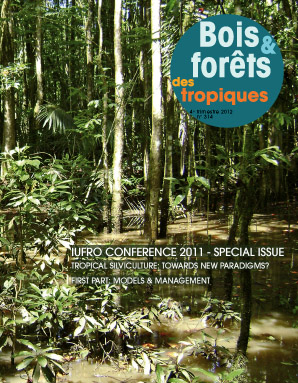Sylviculture sociétale : un nouveau paradigme en quête d'une conservation durable des terres sous les tropiques ?
DOI :
https://doi.org/10.19182/bft2012.314.a20488Mots-clés
Modèle, sylviculture, Aménagement forestier, Gestion foncière, forêt tropicale, Développement durableRésumé
A novel and sustainable agroforestry system was designed and implemented with great initial success in the Democratic Republic of Congo (PROCES et al., 2011). Each farmer and family was allocated 25 hectares in which to live, plant cas- sava (a root crop) and trees for lumber and other forest prod- ucts: Acacia auriculiformis. The scheme, which included farmer training, involved traditional cultivation methods and management of fallow lands. The economic success of the first rotation of the system was evident as measured by a net profit of $5,000 per family, which was similar to what a teacher made in the capital city of Kinshasa. The main issue raised by the silvicultural use of the land was a small reduc- tion in soil potassium, which could be addressed in the sec- ond rotation. Unfortunately, the second rotation was not as successful as the first in terms of yields, because the initial group of farmers used the money from the first rotation to move their families to the capital city, leaving untrained rela- tives to deal with their farms...
Téléchargements
Références
CARVALHAES M. A., SILVA K. J. D., OLIVEIRA R. E., ZAKIA M.
J. B., SANTOS M. F., SILVA M., 2011. Participatory construc- tion of best management practices for babaçu palm extractivism in Northeastern Brazil. In: Research priorities in tropical silviculture: towards new paradigms, p. 28, in : Sist, P., editor, IUFRO International Conference, Montpel- lier, France.
ESBJÖRN-HARGENS S., ZIMMERMAN M., 2009. An overview
of integral ecology. Resource Paper n°. 2. Integral Institute, Louisville, CO, p. 1-14.
EVANS J., 1992. Plantation forestry in the tropics, second edition. Oxford University Press, Oxford.
LEACH M., 2008. Pathways to sustainability in the forest? Misunderstood dynamics and the negotiation of knowl- edge, power, and policy. Environment and Planning A, 40: 1783-1795.
MACNAGHTEN P., 2003. Embodying the environment in every- day life practices. The Sociological Review, 63-84.
O’BRIEN K., 2009. Responding to climate change: the need for an integral approach. Resource Paper n°4, Inte- gral Institute, Louisville, CO, p. 1-12.
PROCES P., BISIAUX F., MARIEN J.-N., 2011. Mampu agro-
forestry system in DRC: Is it sustainable and can it be a model for large-scale plantations? Research priorities in tropical silviculture: towards new paradigms, p; 102 in : Sist P., editor, IUFRO International Conference, Montpel- lier, France.
REDMAN C. L., GROVE J. M., KUBY L. H., 2004. Integrating
social science into the long-term ecological research (LTER) network: social dimensions of ecological change and ecological dimensions of social change. Ecosystems, 7: 161-171.
SALAS-ZAPATA W., RÍOS-OSORIO L., ÁLVAREZ-DEL
CASTILLO J., 2011. La ciencia emergente de la sustentabil- idad: de la práctica científica hacia la constitución de una ciencia. Interciencia, 36: 699-706.
Téléchargements
Numéro
Rubrique
-
Résumé137
-
PDF141
Publié
Comment citer
Licence
 Les articles sont publiés en Accès libre. Ils sont régis par le Droit d'auteur et par les licenses créative commons. La license utilisée est Attribution (CC BY 4.0).
Les articles sont publiés en Accès libre. Ils sont régis par le Droit d'auteur et par les licenses créative commons. La license utilisée est Attribution (CC BY 4.0).









